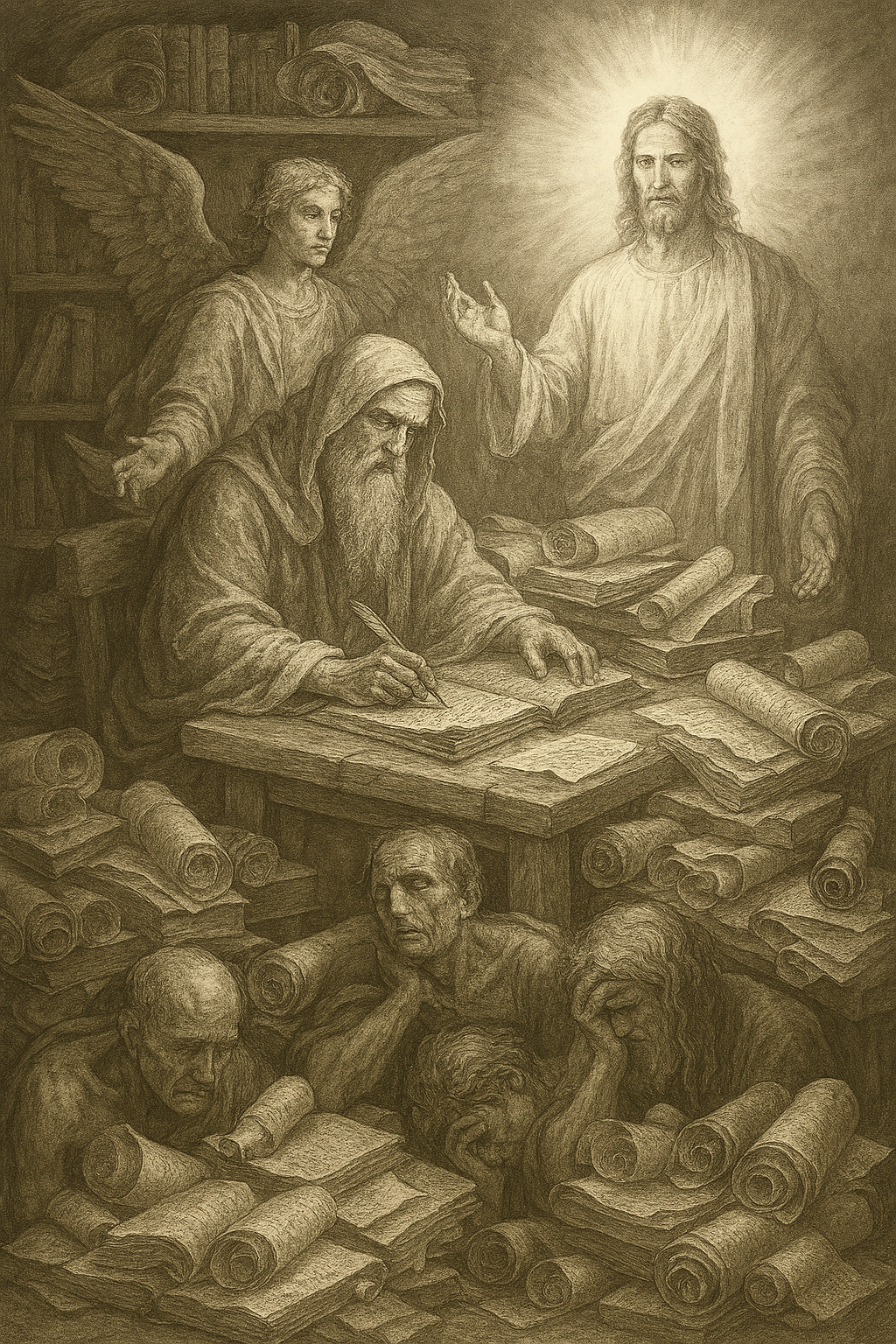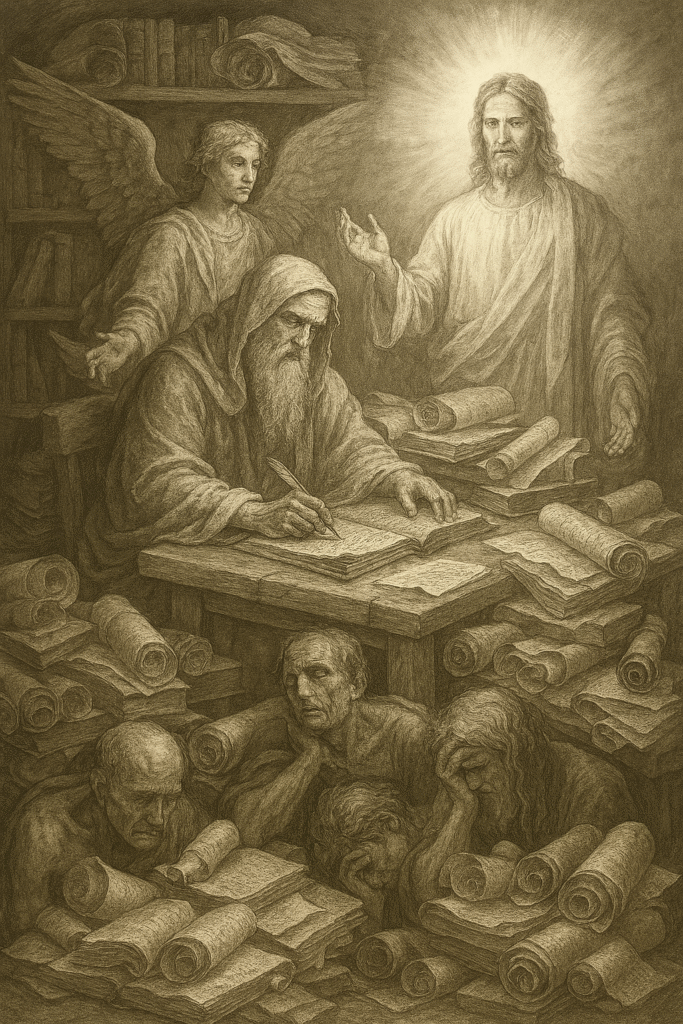Physical Address
304 North Cardinal St.
Dorchester Center, MA 02124
Physical Address
304 North Cardinal St.
Dorchester Center, MA 02124
With Michael Walker
With Michael Walker

To Whom it may concern…

In a world saturated with spiritual shorthand and theological oversimplification, there arises a need for clarity—a need to distinguish between what is divine, what is inspired, and what is merely human. The sacred texts known collectively as the Bible have long been referred to as “The Word of God,” a phrase that, while reverent, has become a catch-all term that obscures the layered reality of what the scriptures actually contain. This deep dive seeks to restore that clarity, to peel back the layers of attribution and voice, and to present a framework that honors the sanctity of divine speech without conflating it with the echo of human lament or the breath of inspired utterance. What emerges is not a dismantling of reverence, but a reconstruction of it—a reorientation toward what can be called “The Living Witness,” a term that encapsulates the full spectrum of speech, covenant, and spiritual agency recorded in the scriptures.
The foundational framework begins with a tripartite distinction of speech within the Bible. First, there is the literal word of God—the direct, unmediated voice of the Father. This is the speech that rends the heavens, that speaks creation into existence, that declares covenant and judgment with unmistakable authority. Genesis 1:3 records, “Then God said, ‘Let there be light’; and there was light.” This is not metaphor, nor is it filtered through human reasoning; it is the raw utterance of the Creator. Exodus 3:14 continues this pattern when God declares to Moses, “I AM WHO I AM”; and He said, “This is what you shall say to the sons of Israel: ‘I AM has sent me to you.’” These moments are not merely historical—they are ontological. They define reality itself. Second, there is the breath of God—the Spirit speaking through human vessels. This is the inspired speech of prophets, apostles, and messengers who, though human, are conduits of divine intent. Isaiah 61:1 declares, “The Spirit of the Lord GOD is upon me, because the LORD has anointed me to bring good news to the afflicted.” Here, the prophet speaks, but the breath is not his own. In the New Testament, this breath continues through the apostles. Paul writes in 2 Timothy 3:16, “All Scripture is inspired by God and beneficial for teaching, for rebuke, for correction, for training in righteousness.” The Greek word translated as “inspired” literally means “God-breathed,” affirming that while the hand may be human, the breath is divine. Third, there is the speech of men—words born of emotion, reaction, and circumstance. These are the groanings of Job, the complaints of Israel, the philosophical musings of Ecclesiastes. Job 3:11 cries out, “Why did I not die at birth, come out of the womb and pass away?” This is not divine decree—it is human despair. Ecclesiastes 1:2 laments, “Futility of futilities,” says the Preacher, “Futility of futilities! All is futility.” These words are recorded faithfully, but they are not the voice of God. They are the voice of man grappling with the weight of existence.
This framework is not merely academic—it is theological precision. It protects the sanctity of God’s voice by refusing to dilute it with human commentary. It empowers discernment by allowing readers to distinguish between divine command and human reaction. It clarifies Christology by anchoring the identity of Yehoshua not in metaphor, but in manifestation. Yehoshua is not the written Bible. He is the audible, embodied voice of the Father. John 1:14 declares, “And the Word became flesh, and dwelt among us; and we saw His glory, glory as of the only Son from the Father, full of grace and truth.” This is not literary symbolism—it is incarnation. Yehoshua is the Word not because He is a book, but because He is the voice made flesh. His origin is holy not by designation, but by nature. Luke 1:35 affirms this when the angel says to Mary, “The Holy Spirit will come upon you, and the power of the Most High will overshadow you; for that reason also the holy Child will be called the Son of God.” He was not formed from dust, as Adam was, but from divine utterance. He is uncommon, consecrated, and set apart—the very definition of holy.
This leads to a profound understanding of covenant. The Torah was not a universal moral code—it was a legal contract between God and Israel. Exodus 19:5-6 states, “Now then, if you will indeed obey My voice and keep My covenant, then you shall be My own possession among all the peoples, for all the earth is Mine; and you shall be to Me a kingdom of priests and a holy nation.” This was not spoken to the world—it was spoken to Israel. The Torah defined holiness by instruction, by ritual, by separation. But Yehoshua fulfilled that contract. Matthew 5:17 records His words: “Do not presume that I came to abolish the Law or the Prophets; I did not come to abolish, but to fulfill.” Fulfillment is not rejection—it is completion. And when a contract is fulfilled, it is no longer in effect. Romans 10:4 confirms this: “For Christ is the end of the Law for righteousness to everyone who believes.” The covenant was completed, and with that completion came a new covenant—one not based on instruction, but on faith. Hebrews 8:13 declares, “When He said, ‘A new covenant,’ He has made the first obsolete. But whatever is becoming obsolete and growing old is about to disappear.” This new covenant is not exclusive—it is inclusive. It is offered to the world, not just to Israel. Holiness is now defined by union with the one who fulfilled the instruction, not by the instruction itself.
This understanding dismantles several pervasive misconceptions. First, the idea that the Messiah is the Bible is false. Yehoshua is the Word made flesh, not the literature. Second, the claim that the Bible was written by men is misleading. It was recorded by men, capturing divine speech, spirit-breathed utterance, and human expression. Third, the notion that all scripture is equally divine fails to account for voice attribution. Not all speech within scripture is God’s voice. Fourth, the belief that believers today are still under Torah ignores the legal reality of fulfillment. Galatians 3:24-25 states, “Therefore the Law has become our guardian to lead us to Christ, so that we may be justified by faith. But now that faith has come, we are no longer under a guardian.” Fifth, the assumption that the epistles are just letters from men overlooks their spiritual authority. 1 Thessalonians 2:13 affirms, “For this reason we also constantly thank God that when you received the word of God which you heard from us, you accepted it not as the word of mere men, but as what it really is, the word of God.” Sixth, the dismissal of the Old Testament as obsolete ignores its prophetic relevance. The apostasy of Israel mirrors the spiritual posture of the world today. Jeremiah 2:13 laments, “For My people have committed two evils: They have abandoned Me, the fountain of living waters, to carve out for themselves cisterns, broken cisterns that do not hold water.” Seventh, the reduction of the Bible to a moral guidebook misses its true nature. It is a living witness of divine interaction, covenant, and revelation. It is not merely ethical instruction—it is relational testimony.
The implications of this framework are vast. Voice attribution prevents misinterpretation. Covenant clarity prevents legalistic error. Christological precision restores honor to Yehoshua’s identity. Debunking misconceptions promotes authentic discipleship. This is not just a study method—it is a spiritual reformation. It invites readers to engage with scripture not as a monolith, but as a mosaic. Each piece has its source, its purpose, its voice. Some are commands. Some are laments. Some are breath. Some are flesh. Together, they form a witness—not a static artifact, but a living testimony.
The Living Witness is not a book. It is a courtroom record, a prophetic archive, a covenantal ledger, and a relational diary. It is the voice of the Father, the breath of the Spirit, the embodiment of the Son, and the echo of humanity. It is not to be flattened into a single category or reduced to a single function. It is to be discerned, honored, and rightly divided. As Hebrews 4:12 declares, “For the word of God is living and active, and sharper than any two-edged sword, even penetrating as far as the division of soul and spirit, of both joints and marrow, and able to judge the thoughts and intentions of the heart.” This is not literature—it is life. This is not metaphor—it is manifestation. This is not confusion—it is clarity. The Living Witness stands not as a relic, but as a revelation. It speaks still, and it speaks truly. Let those who have ears to hear, hear what the Spirit is saying.